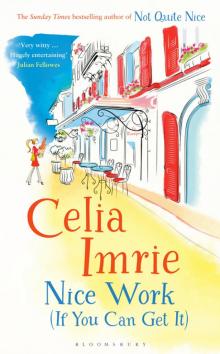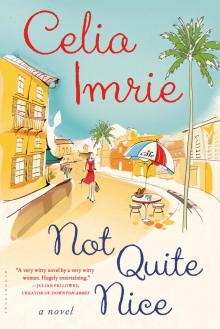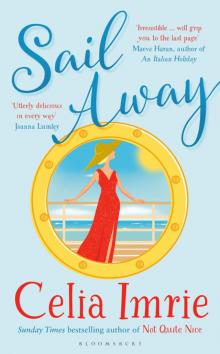- Home
- Celia Imrie
Nice Work (If You Can Get It) Page 12
Nice Work (If You Can Get It) Read online
Page 12
Benjamin, meanwhile, sat in La Mosaïque all day, making sure that the workmen kept on at it, assisting the telecom engineers who were installing the restaurant’s official phone line, and being there to sign for deliveries. With his phone always on, he was ready to help co-ordinate the others, while he unpacked chairs and assembled tables.
Theresa was at home working. She had a plan. Before the official licence came through, they would have a few test runs with some friends. They couldn’t officially take money for such a thing, and if the friends wanted wine or any other alcoholic beverage they would have to supply their own. She hoped they would do the decent thing and leave a little ‘gift’ in the pot to cover the cost of the raw materials.
Later in the week they decided they had better gather to interview some local people for positions assisting in the kitchen and to wait at the tables, to cover themselves if ever one of them was ill or needed time off. They were all facing the reality of this round-the-clock commitment. Adverts were in the local papers and the interviews would take place as soon as the building work was complete. That way they could show the potential employees around the premises.
Carol was working away to match the exact lettering from the sign outside, copying it on to a foldaway sandwich board which they could place on the pavement displaying the day’s menu. All the designs she had come up with were based on the theme of the mosaic. She had already started painting little zodiac motifs on the dining-room walls. William had not been happy with the receipts she had handed him for acrylic paints and sable brushes.
‘One hundred-plus euros for a few tubes of paint?’ he cried. ‘What are they made from, liquid gold?’
‘The colours had to match the floor, William,’ Carol said. ‘I can’t help it if those were the most expensive colours. The pigments in them must be pricey or something.’
Theresa was also worried by Carol’s apparent lack of concern about splashing out, rather than searching for cheaper alternatives. It was all very well for her. It wasn’t her own money going up in smoke.
Meanwhile Theresa had assembled and costed menus to last at least a fortnight. While balancing the prices, she made up her mind to use only the fruits and vegetables of the season, which, in a place like Bellevue-Sur-Mer, wasn’t all that difficult.
Theresa was also refining her original idea for the food: local specialities – socca, pissaladière, tourte de blettes sucrés – mixed with very traditional English dishes like toad in the hole, lemon syllabub and summer pudding. That way she also hoped they would appease Marcel and the folk at the brasserie, where they served what was known locally as Mediterranean cuisine – salads, pizzas, fish and meat.
Theresa felt guilty. She knew she should be actually practising the recipes. Sometimes these things looked all very good on paper but then didn’t work out on a plate. Other times it was technically impossible to make these dishes without a huge team of helpers, pastry cooks, sous-chefs and the rest. She knew she had to try everything out before officially committing it to the menu. It was simply finding the time and space.
Despite her extravagance, Carol was a fine lodger. She offered some inspired suggestions towards Theresa’s work, like making fish and chips using battered sea bream, with panisse chips – panisse being another local dish, not unlike socca, made from chickpeas. She also made sure not to get under Theresa’s feet and spent a lot of her time in the small box room. She rose early most mornings, and often when Theresa came into the main room there was a pot of coffee brewing and a fresh baguette waiting on the table, laid ready for breakfast.
And in the evening, when they were both dog-tired from working on preparations for the opening, it was lovely to have someone to chat and share a bottle of wine with before turning in.
Added to which, Carol was always so droll and amusing.
It was Carol who had the idea that to refresh their heads they should not have their next meeting at the usual places – the restaurant, Theresa’s apartment or William’s – but instead go into town and meet on the terrace of a bar on the Cours Saleya in Nice. That way they could share a drink in a buzzy ambience and discuss everything in a neutral space.
They all carried their portfolios to the bar – William’s consisting of the certificates and an appointment schedule, Theresa’s her menus and costings, Benjamin’s a checklist of what had arrived and what was still to come, and Carol’s her designs.
Although they sat on a busy terrace, bathed in the warm rosy evening sun and surrounded by other people, while techno music played softly from nearby speakers, its repetitive beat drowned out by laughter and chatter, they conducted the meeting as though they were in a boardroom and put forward their work one by one, followed by a joint discussion.
In the centre of the table was an ice bucket with a large bottle of rosé wine. Beside it there were four small plates of olives ( both large green and tiny, local black Niçoise), pizza slices and pissaladière squares for them to nibble on.
When William talked about the licence, his holy grail, he turned and pointed to a red, white and blue enamelled plaque on the wall of the bar. ‘There you are. That’s the precious thing we’re after. Grande licence level four. Displayed by law.’
All four of them spent a few seconds staring up at the licence.
‘It’s both hard to get, costs an arm and a leg and even when we get it we cannot serve alcohol for several weeks.’
They looked away from the plaque as though it had disappointed them and turned to Carol, ready to hear her plans.
She pulled out her portfolio. Inside were drawings for the menu decoration, all sketched and linked into the mosaic theme. For her own reference she had also painted a replica of the floor, in its full glory. It reminded Theresa of the vivid blues, reds and yellows of a stained-glass chapel window.
‘As you can see,’ said Carol, ‘I have taken as my main inspiration the patterns of the original floor. It’s almost there,’ she said as she laid the drawings out one by one. ‘I just have to refine them a little.’
‘Glad you opted for grey and white, in the end, for the actual menu design, Carol,’ said William, picking up the top one. ‘Colour printing is prohibitive.’
‘It’s also pretty naff,’ said Carol. ‘A multicoloured menu smacks to me of desperate tourist places. Next thing we’d have fading photos of the food displayed outside, and little language flags everywhere.’
‘There’s somewhere up the road which has actual plates of food on a table outside the restaurant,’ said Benjamin, full of glee. ‘They look like four plates of sick.’
‘We won’t be trying that,’ said Theresa.
‘Amazingly, the place always has customers.’ Benjamin sat back in his seat, surveying the crowds drifting past the bar.
‘Let’s hope we do.’ William flicked through Carol’s work, then topped up everyone’s glass.
‘Oh look, there’s Sally,’ said Benjamin, rising to his feet. ‘And – OMG – check out the handsome hunk she’s with. Who is that? I’ve never seen him around the place.’
Sally was with Stanislav.
He had called Sally that morning, asking if she’d care to join him, along with Destiny and her husband, for dinner. Since her fun day out with Diana, her new motto was ‘Why not?’
Benjamin whispered to the table: ‘What goss! Sally has a new secret beau. But not so secret for long.’ He raised his voice and waved frantically. ‘Sally! Sally! Come and say hello, stranger!’
Sally glanced across the crowded terrace and saw them all assembled, faces beaming in her direction. ‘You don’t mind, Stanislav, do you? Come and meet my friends.’
They squeezed between the diners to reach the back of the bar, and stood beside the table.
‘Glass of rosé?’ William stood up, holding the dripping bottle, while Sally introduced everyone to Stanislav.
Theresa couldn’t help noticing that when he shook hands with the Russian, Benjamin put on his best pout.
‘No, thank you,’ said
Stanislav. ‘Sally and I are on our way to dinner with some friends. What are you up to? It looks interesting.’
He picked up one of Carol’s sketches which lay on the table.
‘Lovely drawing. What is that?’
Carol blushed. ‘Oh, it’s not really me. It’s all based on a thing we’re doing in Bellevue-Sur-Mer.’
‘A restaurant,’ chipped in Theresa, already wanting to spread the word, especially to someone who liked to eat out. ‘La Mosaïque. We open next week.’
‘Deo volente,’ added William.
‘What’s the problem?’ asked Stanislav.
‘No problem,’ replied William. ‘We’re just waiting on our licence.’
‘Do you have a card with opening hours, etcetera?’
Theresa was already rooting in her bag for the packet of business cards, which had arrived from the printer’s last night.
‘Here you are,’ she said, placing a card in Stanislav’s hand. ‘Maybe you’d like to book for our opening night?’
Stanislav turned to Sally.
‘What do you think, Sally?’
‘I was hoping to go anyway. But yes. If you’d like to come with me?’
‘A table for two please.’ Stanislav made a slight bow, and started to move away. ‘Now we must go, I’m afraid, or we will be late for our friends.’
As they walked off Benjamin whistled under his breath. ‘What a corker.’
‘I’ll say,’ said Carol. ‘Lucky old Sally.’
Theresa waved her diary in the air. ‘Who cares about that,’ she cried. ‘We just made our first booking.’
The adjacent table of four Irishwomen, every exposed plump piece of flesh rose-pink, giggled and nudged one another, clinking glasses at the sight of Stanislav’s retreating back, then bellowed their approval with laughter.
‘To business!’ William replaced his spectacles and picked up Benjamin’s delivery papers. ‘Now, Benjamin, which items are still to arrive?’
Theresa could feel her phone vibrating in her handbag. Surreptitiously she took it out and glanced at the screen, just in case it was a supplier. It was Imogen.
Well, it hadn’t been convenient when Theresa had phoned her, and now it wasn’t convenient to take Imogen’s call, so Theresa pressed the red button and slipped the phone back into her handbag.
She would ring back after the meeting was over.
When she reapplied her full attention to the discussion, Carol was suggesting she have a go with the chairs, which were plain white. ‘I thought I could apply little painted simulated pieces of the mosaic here and there. To keep up the theme. I also found a set of serving plates with a mosaic motif.’
‘Too pricey.’ William glanced at the paperwork and slid it back to Carol.
Benjamin moaned. ‘I like them.’
‘All right,’ said William. ‘Perhaps when we have some money coming in.’
Carol uttered a disgusted sigh. ‘William, sometimes you are so tight.’
‘Madam,’ he replied. ‘I want us to earn a living.’
Finally they turned to publicity. Benjamin had arranged with a girl from the local newspaper to do a small article, while Carol had got on to all the main restaurant guides: Michelin, Gault et Millau and the rest.
‘They don’t give you any warning,’ she said. ‘But I was tipped off that one reviewer is in the region at the moment. We just have to look out for a man eating alone with a notebook!’
‘If only it was that easy,’ said William. ‘We actually have to make sure we’re always at our best.’
After an hour, when the business was finished, William called the meeting closed and they all put away their papers and relaxed. The main subject of conversation was Sally’s date.
* * *
Sally was really enjoying herself. The candlelit restaurant with its soft piano music was chic and romantic. The food was divine.
Mickey MacDonald, with his thick Liverpool accent, was quite the clown, and his repartee with Destiny was very amusing and affectionate. Many of the other diners, both male and female, were giving him admiring looks.
Sally thought about how a footballer played to massive audiences, where, in true Aristotelian form, he could be the beloved angel or the cursed demon. She remembered one of her tutors at RADA talking about how he wished theatre audiences could have more of the atmosphere of the crowd on the football terraces. Despite all those years in between, until now Sally had never met a footballer.
Mickey was funny, and somehow his downbeat droll way of speaking complemented Destiny’s brash scattiness.
Stanislav was, as usual, the attentive host.
But today, Sally noticed, maybe because Destiny had a husband to look after her, he was very much more attentive to her.
They talked about Sally’s kids, asked where they lived and what they did. She was rather perturbed when she realised that both of her children were essentially wanderers, of no fixed abode. He asked questions about her career as an actress and whether she missed the attention and the fame. Was she perhaps tempted to move back to London and start it up again?
Sally explained that it was an odd thing. For the most part she couldn’t think of anything worse than going back there and living the on-off life of an actress, waiting for the phone to ring, being rejected at auditions, packing your bags when you suddenly got a film part which meant you’d be on location in the Orkneys or Turkey in two days’ time and have to arrange people to come in and look after your pets or water your plants. But then, unexpectedly, acting friends would reappear, as Jackie and Diana had done, and a strange yearning returned. A desire for the hobo life, the never knowing what would happen next.
Stanislav was amused by this.
Did she miss London? As she lived permanently in France, would she consider giving up her British citizenship?
‘Do you know, Stanislav, it’s only the red tape that puts me off getting a French passport. All that stuff about pensions and so on. I couldn’t face the paper trail. I’m happy to let sleeping dogs lie.’
‘A strange way of putting it,’ he said, and laughed. ‘But this way, I suppose, you have the best of both worlds.’
Stanislav then asked Sally about her friends in Bellevue-Sur-Mer and their plans for the new restaurant.
‘They asked me to join them, but you know, that kind of thing doesn’t interest me as much as the theatre or movies or boats, so I declined.’
‘What’s this?’ asked Mickey. ‘Your friends own a restaurant?’
‘They’re setting one up. It’s going to serve Provençal dishes with an English twist.’
‘What the blithering heck does that mean?’ asked Destiny.
Sally hesitated then admitted she hadn’t a clue and everyone laughed.
Sally took one of the delicious petits fours being offered her with the coffee. ‘I think it’s important to be passionate about anything you’re investing in.’
‘I completely agree,’ said Stanislav. ‘For instance, I have just bought a large share of Mickey’s football team, and I am fully backing the new project he is starting with kids around the globe.’
Mickey looked up and raised his glass for a toast.
‘To the “Kids Have Goals” project!’
Destiny, Sally and Stanislav echoed his salute.
‘He’s having a big do next week at the local stadium, Sally,’ said Destiny. ‘I’ll be there as support. Fancy coming? It’s a gala football game, to raise funds, you know.’
Sally told Destiny that she’d look in her diary and get back to her. She hoped that way she could avoid it. A football match didn’t seem much of a fun afternoon to her.
When it came to the time to pay the bill it turned out that Stanislav had settled it even before sitting down. Sally was impressed. The man might have money, but he also had style.
‘And now I have a car waiting to deliver us to our respective homes,’ he said. ‘But first I would like to take you all somewhere special.’
‘Oooh, not
that ruddy boat, Stanny, please.’ Destiny gathered her clutch bag and stood up. ‘I’d hate to lose that lovely supper into the Mediterranean.’
‘I’m quite aware of your preference for dry land, Destiny.’ Stanislav held Sally’s chair as she too rose to her feet.
‘Shut yer face, Ligorish Boy,’ said Destiny.
‘Does he like liquorice?’ asked Sally, as they got their coats.
‘Dunno,’ said Destiny. ‘It’s just something he’s always saying when he speaks Russian on the phone. It’s ligorish this, vigorish that.’
A shiny limo waited for them outside the restaurant. Stanislav held the door open as they all climbed in the back. Stanislav himself got into the front with his chauffeur and the car revved away along the Promenade des Anglais and then headed inland along steep winding roads, while loud rock music thumped out from the magnificent sound system.
After about fifteen minutes’ drive, the car turned in to a pair of high gates that opened by remote control.
‘This is my Riviera pied-à-terre,’ said Stanislav as the limousine pulled in beside the front door. ‘Welcome to my domaine privé.’
The house door opened and a butler and maid stepped out, ready to assist Stanislav and his guests.
‘Champagne and a few canapés in the lounge, thank you, Cecile. Then you can both retire for the night.’
Mickey stepped forward. ‘Actually, Stanislav, could I have a pot of PG Tips?’
‘What’s that?’
‘What’s that?’ echoed Destiny. ‘A cup of good old builder’s tea is what it is.’
‘Builder’s tea?’ Both Stanislav and the butler looked bewildered.
‘He just means a pot of strong tea,’ explained Sally.
‘English Breakfast?’ asked the butler.
Destiny laughed. ‘Breakfast at midnight. But yes, love. That would be gorge. Ta.’

 A Nice Cup of Tea
A Nice Cup of Tea Nice Work (If You Can Get It)
Nice Work (If You Can Get It) Not Quite Nice
Not Quite Nice Sail Away
Sail Away